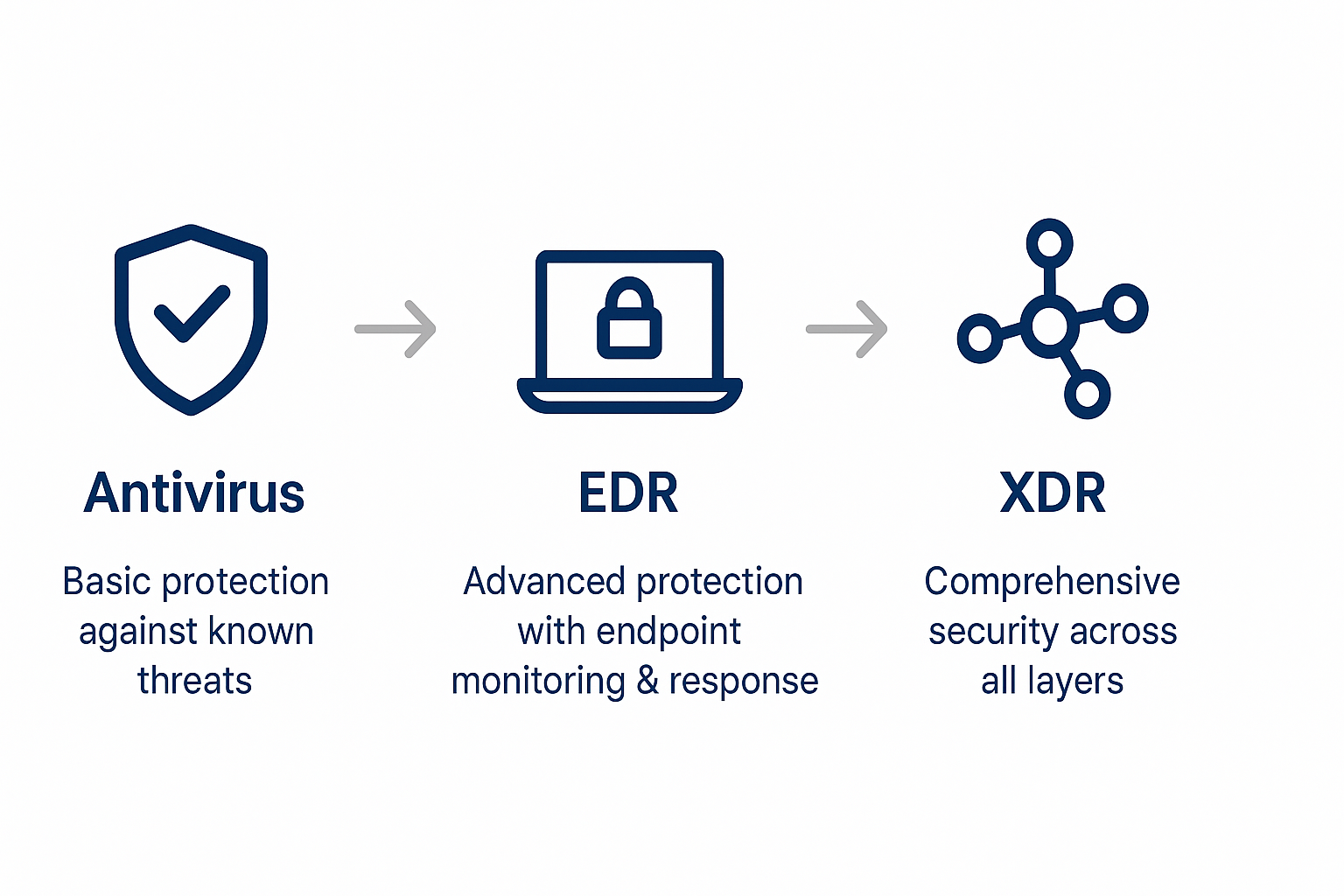What’s Better for Protecting Your Computer in 2025 — Antivirus or EDR?

Many people still believe that antivirus software is all you need to protect your computer.
While antivirus is important, cyber threats in 2025 are far more advanced — and so should your protection.
Modern hackers don’t just send viruses; they use ransomware, phishing, fileless attacks, and even stealthy methods to avoid detection. This is where EDR (Endpoint Detection & Response) and XDR (Extended Detection & Response) come into play.
What Is Antivirus and How Does It Work?
Antivirus is like having a security guard at your computer’s front door.
It scans every file, email attachment, and program that enters your system and blocks anything that matches a known malware signature.
Advantages of Antivirus Software:
- Quick detection of known viruses and malware
- Runs silently in the background
- Simple to install and manage
Limitations of Antivirus:
- Can miss new, unknown, or fileless threats
- Does not actively monitor behaviour
- Cannot automatically recover files after an attack
What Is EDR and Why Is It Better Than Antivirus?
Endpoint Detection & Response (EDR) does everything antivirus does — plus much more.
It’s like having a guard at the door and a detective inside watching for suspicious activity 24/7.
If ransomware tries to encrypt your files, EDR can detect it in real time, block the attack, remove the malicious software, and restore your data.
Benefits of EDR Security:
- Stops both known and unknown threats
- Monitors for suspicious or abnormal activity
- Responds instantly to block attacks
- Can roll back damage from certain cyber incidents
What Is XDR and How Is It Different From EDR?
If EDR is like having a guard at the door and a detective inside your computer, XDR is like having an entire security team watching all your buildings, doors, windows, and cameras at once.
While EDR focuses on protecting individual devices (PCs, laptops, servers), XDR connects security across your entire IT environment — computers, email systems, networks, cloud apps, and more.
If a hacker tries to get in through a phishing email, spread to a laptop, and then move onto your server, XDR can see the full attack chain and stop it before serious damage is done.
Why XDR Is Powerful:
- All the benefits of EDR
- Monitors multiple security layers
- Detects coordinated and multi-step cyberattacks
Antivirus vs EDR vs XDR — Which Should You Choose?
- Basic home users → Antivirus may be enough, but it’s minimal protection.
- Anyone storing important personal or business data → EDR is a must-have in 2025.
- Businesses with multiple systems, emails, and cloud apps → XDR offers the most complete defence.
|
Feature / Benefit |
Antivirus |
EDR (Endpoint Detection & Response) |
XDR (Extended Detection & Response) |
|---|---|---|---|
|
Stops known threats |
✅ Yes |
✅ Yes |
✅ Yes |
|
Stops new & unknown threats |
❌ No |
✅ Yes |
✅ Yes |
|
Monitors for suspicious behaviour |
❌ No |
✅ Yes |
✅ Yes |
|
Automatic threat response |
❌ No |
✅ Yes |
✅ Yes |
|
Rolls back damage after attack |
❌ No |
✅ Yes |
✅ Yes |
|
Covers all devices in your network |
❌ No |
❌ No |
✅ Yes |
|
Protects email, cloud & network |
❌ No |
❌ No |
✅ Yes |
|
Best for |
Basic home use |
Personal + business device protection |
Complete business environment security |
Final Recommendation
Antivirus is like locking your front door.
EDR is like having an alarm system and security patrol.
XDR is like having a full-time security operations centre watching everything at once.
✅ In 2025, you should have at least EDR as your baseline protection — antivirus alone is no longer enough.
